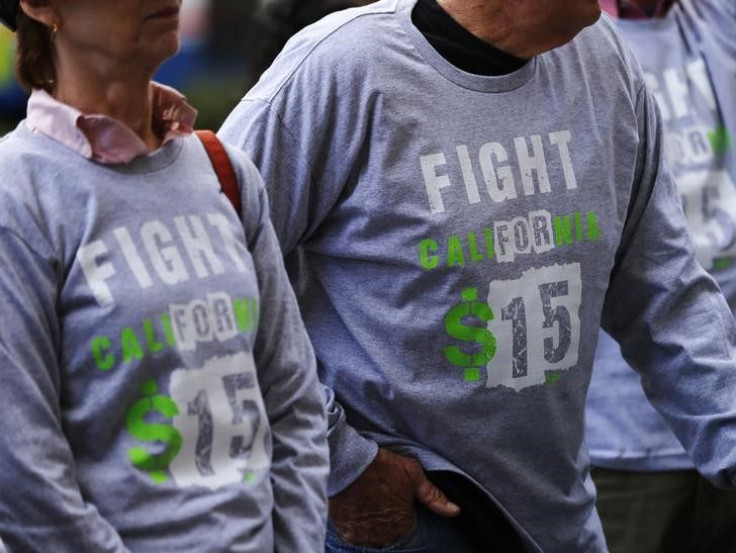Why Labor Won $15 In California, And Why Their Plan Is Going National

California unions and progressive activists won big Monday when Gov. Jerry Brown announced a deal on legislation that would raise the minimum wage from $10 to $15 an hour. The wage hike agreement doesn't just promise a major boost to low-income workers; it's also confirmation of a new political strategy that organized labor is already taking nationwide.
Legislators in the Golden State reached an agreement on the minimum wage increase only after labor unions and their progressive allies had already collected enough signatures to put a $15 referendum on the November ballot. The campaign for that ballot initiative was part of a national strategy managed by the Fairness Project, a labor-backed group that launched to much fanfare in October 2015.
The Fairness Project — whose primary funder is SEIU-UHW, a healthcare workers' union based in California — is also trying to get minimum wage measures passed by ballot initiative in Maine and the District of Columbia this year. SEIU-UHW President Dave Regan told International Business Times there could be more initiatives coming this cycle.
"There are a lot of states where it's still possible to qualify, and I think the Fairness Project is looking at those," said Regan. "Hopefully the momentum will create opportunities."
Policymaking by popular vote is a particularly attractive tactic for unions given that legislatures have been moving to the right in most states over the past few years. As of last year, Republicans controlled both chambers of 30 state legislatures; Democrats had unified legislative control in only eight states.
Republican state-level dominance has been a major boon for outside conservative groups like the American Legislative Exchange Council, a nonprofit that crafts business-friendly "model legislation" to be adapted and introduced in legislatures across the country.
Whereas ALEC implements a national strategy through statehouses across the country, the Fairness Project is beginning to implement a national strategy through statewide popular votes. Regan said he thinks the Fairness Project could even succeed in states where the government leans substantially to the right of California's.
"In those types of places, this is the only way that you can accomplish these kinds of objectives," said Regan. "In California, the Legislature is reacting to what we placed on the ballot. In a place like Florida, the Legislature would not react the same way, but we believe that the voters would."
Indeed, the conservative state of Nebraska has already raised its minimum wage by popular referendum. In 2014, before the Fairness Project was created, the state approved a proposal raising its minimum wage from $7.25 to $8 in 2015, followed by another raise to $9 in 2016.
California's minimum wage proposal, if implemented, would raise the state to more than double the federal minimum wage of $7.25 per hour. The hike would be implemented in stages, raising the state's minimum wage from $10 to $10.50 next year, from $10.50 to $11 in the following year, and then for one more dollar every year until it reached $15 in 2022.
An earlier version of this article incorrectly gave an incorrect dollar amount for the minimum wage proposal in Maine.
© Copyright IBTimes 2024. All rights reserved.












